- Home
- Penelope Lively
The Road to Lichfield Page 3
The Road to Lichfield Read online
Page 3
‘It goes back a long way,’ said the manager. The typewriter was overlaid by the rustle of papers. ‘Since – oh, ever since he’s had his account with us. Ten pounds a month. He put it up to fifteen the year before last.’
‘I see,’ said Anne. ‘I – I’ll have to look into that. Can you just leave it for the moment. But I think cancel the club subscriptions, if you would.’
She put the receiver down in bewilderment. Ten pounds a month – fifteen? Out of her father’s far from lavish pension? For a moment she was visited with the idea of some enormous, continuing mistake on the part of the bank, and then knew that her father would never have overlooked such a thing. Ten pounds could only be ten deliberate pounds. I don’t know – how extraordinary. Could he have borrowed money from someone, once? Surely not – not father. Is it someone who worked for them? But they never had anyone. I’ll have to ask Graham, she thought, or even father himself if he’s a bit clearer before I go.
Having decided to visit the nursing-home in the afternoon and devote the morning to sorting things out in the house, she set off into the village to call on Mrs Ransome and thank her for all she had done. It was probable, too, that she was owed money.
The day was fine, the landscape aching under a cold spring wind that poured though the scanty trees and sent the last leaves of autumn spinning round her feet. Here, the season was as yet only a faint green mist lying over fields and hedges; down in Berkshire the leaves already offered rumpled shapes. It was as though, moving upwards on the map, you moved backwards, by a week or so, in time, as though too in the conservatism of the climate regional idiosyncracies made their last stand. You could read the same newspaper everywhere, but must travel to look again at last week’s flowers. And I should move about more, Anne thought vaguely, by myself like this, you see things differently.
Mrs Ransome lived in one of a pair of brick cottages beyond the Post Office. She offered tea, switched off a chattering radio, and asked diffidently if Mr Stanway was likely to come home.
‘I’m afraid not.’
‘I thought that. He’d got like my mum was, towards the end. You know, don’t you, when a person’s bound to go. Is he comfortable enough?’
‘I think so,’ Anne said. She saw again her father’s face on the pillow, with its strange quality of removal, inscrutability, emptied of the kaleidoscopic responses of other faces. The woman, as though picking up the thought, said, ‘It’s hard to tell, isn’t it, when they can’t really say any more. It’s like with a baby.’ They sat in silence for a moment, looking out of the window to where, in the primary school playground, children wheeled and shrieked on the tarmac.
‘He was always a nice person to work for. We let each other alone.’ Mrs Ransome laughed, suddenly. ‘More tea, Mrs – er …? To tell you the truth, I don’t think he noticed much what the place was like. A man gets like that, living alone, doesn’t he?’
‘I suppose so.’
‘Mind, I can’t think of him as a family man, somehow. I was ever so surprised when he first mentioned you and your brother. I’d thought of him as, well, a bachelor type.’ She looked attentively at Anne. ‘I hope you don’t mind my saying that. It was there being no photos about, that kind of thing.’
‘They’re all in drawers, I suppose. Yes, I see what you mean.’
It surprised her that her father, so welded to her own past, could suggest to a stranger someone entirely different – a man untethered by commitment and obligation. She remembered how one of her own children when very small had gazed up at her in curiosity once, returning from school, and said, ‘When I’m not here all day where are you, what happens to you, are you here, in the house?’ Mrs Ransome’s remark had discovered in her the same self-absorption, the same assumption of those we know best as extensions of ourselves.
‘He didn’t mind being on his own, I’d say. Not like some people would.’
‘Yes, I think perhaps that’s true.’ Mother did, though – she always hated him being away so much. And us going, when we did. She kept our possessions like anchors, it was always her who answered the phone, wrote every week, tried – too hard – to keep up with our friends. She remembered her mother making a fuss of Graham’s Cambridge girl-friends – slick glossy creatures who thought his parents drab. And patronized me, she thought – the earnest little sister.
She said to Mrs Ransome, ‘I imagine we must owe you something – I’d like to settle up, if you could just tell me how much.’
The money lay awkwardly among the tea-cups. Seeing Anne to the door, Mrs Ransome said, ‘I’d go to see him, but I’m not that often in Lichfield, and I daresay … Well, I don’t want to disturb him.’
‘It’s nice of you, but he’s very confused – he might not know you. He did have a visitor yesterday, in fact – a Mr – Mr Fielding. He used to live here.’
‘That’s right,’ said Mrs Ransome, ‘in the cottage down the lane from your father. He was often in for a chat. They’d go fishing together, too.’ For an instant she seemed about to add to this, and then said merely, ‘He was glad of the company, I’d say, Mr Fielding.’
In Berkshire, the car radio warned Donald Linton that there would be hold-ups on the A329, a lorry having spilled its load. That done, it reverted to the music programme (the same that Mrs Ransome, in Starbridge, now switched on again) while Donald took an expedient turn to the right and then left which would avoid the A329, he being already five minutes late. The music programme, steering a diplomatic course between light and classical, played him a selection from an American theatrical extravaganza of twenty years ago to which, he seemed to remember, he had taken Anne in their courting days. In three years’ time, he thought. I will be forty-five, by which time undoubtedly Thwaites will have retired and I shall be senior partner and on, presumably, nine or ten thousand. At that point, he thought, it might well be wise to sell the house and get something a bit more appropriate from an investment point of view. Like that, for instance. Sitting in a traffic-jam (unheralded by the radio, which was now moving into the overture to The Magic Flute) he contemplated a spruce Georgian building with garden running down to the Thames. Like that, or possibly something with a bit more land. Anne, of course, will take a bit of budging, us having lived in the same place for sometime now and her being inclined to cling to things a bit, but no doubt reason will prevail. The lights changed and he moved off. I wonder, he thought, if Annie got that car seen to, just a wiring job, it wouldn’t take a minute. He travelled in his mind to Starbridge, to review the garage situation there, thought he located one near the pub, and saw, unexpectedly, his father-in-law turn to hand him a drink in that same pub, years ago. ‘Well, Donald, all the best to you both. She’s not a bad girl, my daughter, though I say it myself. A bit intense, occasionally, but I daresay that won’t bother you. Look after her.’ Poor old chap, Don thought, let’s hope it doesn’t drag on too long.
They had got him out of bed and into an armchair. Anne arrived to find a nurse packing cushions around him and arranging a rug over his shoulders. ‘He’s not too bad in himself today, so we’ve sat him up for a bit, but he’s not very clear in his head, I’m afraid.’ She bent to the old man and said, ‘Here’s your daughter, dear, come to see you.’
Anne sat reading the newspaper. Her father was silent, his head nodding, his hands plucking and scrabbling at the rug across his knees. Once he muttered to himself, and chuckled, but when she tried to speak to him he stared at her vacantly: for the most part he seemed quite unaware of her presence. She was surprised when he said suddenly, ‘Are they bringing my dinner now?’
‘No, father, not just yet.’ She pulled her chair closer to him and put her hand on his. ‘How are you feeling?’
He grunted. ‘Who’s that woman there?’
She followed his stare into the corner of the room. ‘There’s no one but me, father. Nobody over there.’
‘Eh?’ His eyes seemed to follow movement, and stop again. ‘Tell her I can’t see her now. She can’t come he
re, it won’t do.’
‘Father, I promise you there’s no one.’ But he had gone back into himself again, apparently half-asleep, his breath rasping.
When the nurse returned Anne mentioned the hallucination.
‘A lot of them do that. Oh, they see all sorts of things – flowers, ships, people. They’re never alone. It’s uncanny sometimes – you don’t know what’s going on in their heads. Now, are you going to help me lift him back into bed? Ready, Mr Stanway? We’re just going to put you back. Lock your hand with mine under his knees, can you, and the other one behind his back. Then lift when I say and swing round as you get his legs up on the bed.’ She was a girl of twenty or so, thin and wiry, her hair scraped back into a pony-tail under her cap, a cheap crucifix pinned to her apron.
His pyjamas gaped open over skin as pellucid and soft as a baby’s. They lifted him onto the bed to an ammoniac reek and the nurse said ‘Just a tick while I get him a clean pair of trousers. Hold him on one side for a minute, please.’ Her actions were an economy of effort, no movement wasted, the soiled garment replaced by the fresh in one sequence of liftings and lowerings. Anne, her hand against the old man’s back, turned awkwardly from the withered bare thighs and genitals. He muttered and grumbled against the pillows, slumped helplessly between them.
‘It’s disappointing for you,’ said the nurse, ‘him being like this, when you’ve come up specially.’
Anne said, ‘He knew who I was yesterday.’
‘They have their ups and downs. That’s what’s interesting about geriatrics.’
‘Don’t you find it – depressing?’
‘Oh, no,’ said the girl vaguely. She arranged the old man in the bed with the kindly detachment of a child tucking up a doll and he lay with compliant orderliness against the pillows, the sheet turned back under his folded hands. Anne thought: how he would hate this if he knew.
‘Mind,’ the girl went on ‘I’d really like to do psychiatric. I’m going to do the course next year, with any luck. There – he’s ready for his dinner now. Are you staying?’
‘No, I’ll look in later.’
James Stanway said, ‘You must go away. I’ve told you before, Betty, you cannot come here, it won’t do.’
But she sat there, smiling and saying nothing, wearing the blue spotted dress she had that summer at Lyme, smiling and smoothing the silk across her knees. It’s not that I don’t want to see you, my dear, he said to her, you know that, but you must realize that it won’t do, that has always been understood between us.
And presently she did indeed go away, though he did not see her go. People jostled and manhandled him in some crowded place: leave me alone, he said, leave me alone, but they were so much stronger and after a while he lay exhausted. The sound of the river was in his head now, running over stones.
Anne ate biscuits and cheese at the kitchen table and thought: this afternoon I must really get down to it, and then I can be off first thing tomorrow. Go through his desk and see what has to be done, and ring the bank manager again. And if there is time I will get out into the garden and do a bit there. She pushed the dirty things into the sink and went through to the study.
The papers on the desk were fairly quickly dealt with. A couple more unpaid bills, an unanswered letter from her cousin, an acrimonious correspondence with the local Water Board (they would have the last word now, and probably never wonder why). She sorted them into piles and made a list of what must be done. Opening the drawers of the desk, though, she found herself reaching back into a disorderly past – five, three, ten years. Letters; receipted bills; membership cards. The pieces of paper charting a lifetime. If, she thought, if I were a stranger, if I didn’t know father – what would all this tell me? Here is a member of the A.A., a householder whose mortgage was paid up fifteen years ago, father of two, husband, subscriber to the Times Educational Supplement, occasional visitor to Trust House hotels. A man who shopped by post for esoteric foods, supported the Preservation of Rural England, and once, when younger, stood at the side of a young woman whose hair was blown across her face by the wind.
Mother, presumably, Anne thought, laying the photograph on the blotter in front of her, in 1940 or thereabouts. I wonder where we were – Graham and I? They must have had a leave somewhere without us. She turned the picture over and in the corner, in her father’s handwriting, saw pencilled ‘Dorset’.
Throughout the afternoon she travelled with the contents of her father’s drawers and files into her own girlhood and childhood. Here were photographs and childish letters and swimming certificates. Here was her mother’s recipe book and her own sixth form prize essay and Graham’s school reports (‘Stanway has a good mind which he uses when he thinks fit or when it suits his purposes’). She began to divide up what she found, thinking that it must be done in the end, eventually, and she might as well make a start. The recovery of forgotten places and events detained her so that only slowly did the piles of papers grow in the grocery boxes she brought through from the larder and labelled ‘A.S.’, ‘G.S.’, ‘Father’, and ‘Throw away?’ Sunlight moved round the room, splashing in turn the desk, the glass front of the bookcase, the trodden-out pattern on the Persian rug. She moved from childhood during the war to time at Oxford and back again through the unending school years. She and Don smiled glassily as bride and groom. From an envelope there slithered another clutch of photographs – the irretrievable faces of her own children in infancy.
Once, before her marriage, she had worked for a short time in the manuscript room of a museum. Sitting now on the floor of her father’s study it seemed to her that this random archive of paper in his desk was the same kind of fitful evidence about people’s lives as those miraculously surviving scraps of Saxon writs and medieval tax returns. They told you facts, but facts stripped of the whole truth. She looked at her wedding photos and thought: mother looks glum but in fact she was the only one who really enjoyed it, and Graham I daresay, pawing that girl I never said he could bring; that day at Poppet Sands was when Paul cut his foot on some glass, just before Don got his new job and we moved to Cuxing.
This was the easiest part, the extraction of what was hers and what was Graham’s, and what could probably be thrown away. The rest, her father’s personal things, she assessed with apprehension and thought: all that must wait, in time I will come to all that. One file only, a box of bank statements, she did open, remembering again that curious standing order, and found the monthly payments, just as the manager had said, leapfrogging backwards over sheets of paper that covered years and years. She could not find when they began, jumbled as the statements were, and put the file to one side. I cannot leave this, she thought, I have to find out what this means.
It was nearly evening. In the garden a blackbird chattered. She went out into the tool-shed and took down a spade and fork from the tidy row of garden implements, each hung in its own place and wiped clean of dirt. The rose-beds were full of groundsel and dandelion seedlings and she set to work there, sifting greenery from the loose damp soil with the fork, working energetically, pausing now and then to admire the scoured bed that she left in her wake, and the roses putting out minute fists of new growth. They had been pruned. Her father must have done that in the autumn or winter, knowing, perhaps, that he would not see next summer’s blooms.
The garden sloped down to a field – rough pasture speckled with grazing cows. Its far end was defined by the line of willows and alders on the river bank. Her father was a member of a syndicate that had fishing rights along this stretch and he had bought the house for its nearness to the river. Wandering down to the fence at the far end of the lawn she could just hear, in the stillness of the evening, the rush of the water round some obstacle. Out of sight, a tractor coughed, started up, and throbbed away out of earshot. At the far right hand side of the field a man came along the river bank, walking slowly, and struck out across the grass.
She went back to the rose-bed and began to dig out an ancient woody plant with little n
ew growth. It mandrake roots, though, plunged deep down into the ground and defied her efforts to drag it out. She had put down the spade and had the stem clutched in her bare hands as she wrestled with it when a sense that she was not alone made her look up. The man who had been walking across the field had reached the fence at the bottom of the garden and as he ducked under it and then stood again she saw that it was David Fielding. He carried a fishing rod and waders.
‘Don’t let me interrupt you. I just thought that while you were here I’d better return your father’s rod.’
Anne said, ‘This bush was defeating me anyway.’ She straightened, and thought: that was what he was talking about yesterday, something about a rod, father must have lent him his. ‘I’m sure my father would prefer you to keep the rod, you know.’
‘Wouldn’t your husband use it? Or your brother?’
‘Heavens, no. They neither of them fish.’
‘It’s a fairly lunatic occupation,’ he said. ‘I seldom catch anything much. Your father could at least be pretty sure of his supper – he was a good fisherman.’
‘But rivers are nice …’
‘Precisely. Rivers are nice.’ Across Anne’s weeded bed, its brown earth as clean and crisp as cake-crumbs, they smiled at each other.
‘Do keep it. None of us has any use for it.’
‘Well, for the summer anyway … I’d like to. It’s a very good rod, you know, worth a lot now.’ He looked down at the mangled rose-bush. ‘Shall I have a go at that for you?’
‘I wish you would.’
He could not move it. Anne laughed. ‘It’s like the World Tree or something – I think its roots go on for ever. I shall have to see if there’s a saw anywhere.’
‘Don’t bother. I’ve got a knife. I’ll hack it off as far down as I can. I shouldn’t imagine it’ll start sprouting underground.’
He reached down into the hole around the root, fumbling with one hand while he held the stem in the other, and as Anne started to say, ‘I’m afraid you must have thought me very off-hand yesterday, the fact is I …’ he brought his hand up sharply.

 The House in Norham Gardens
The House in Norham Gardens Family Album
Family Album Life in the Garden
Life in the Garden Oleander, Jacaranda: A Childhood Perceived
Oleander, Jacaranda: A Childhood Perceived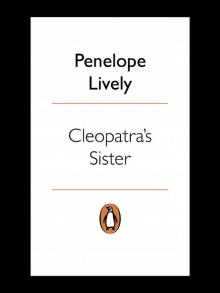 Cleopatra's Sister
Cleopatra's Sister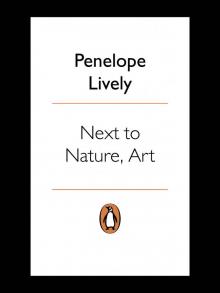 Next to Nature, Art
Next to Nature, Art A Stitch in Time
A Stitch in Time Moon Tiger
Moon Tiger The Photograph
The Photograph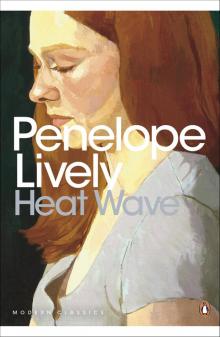 Heat Wave
Heat Wave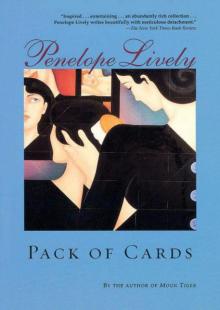 Pack of Cards
Pack of Cards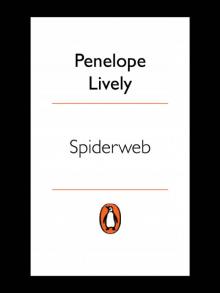 Spiderweb
Spiderweb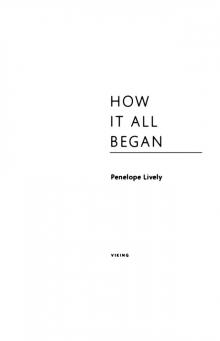 How It All Began
How It All Began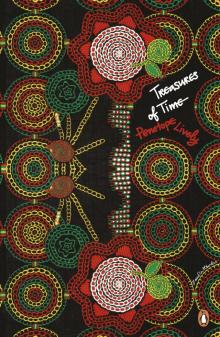 Treasures of Time
Treasures of Time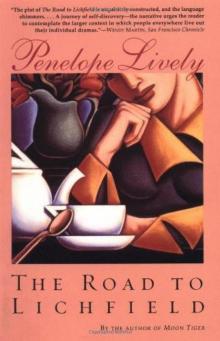 The Road to Lichfield
The Road to Lichfield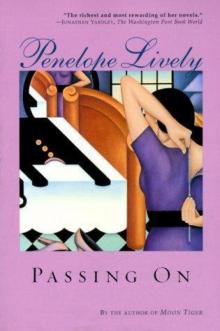 Passing On
Passing On Making It Up
Making It Up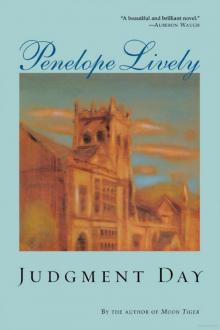 Judgment Day
Judgment Day The Purple Swamp Hen and Other Stories
The Purple Swamp Hen and Other Stories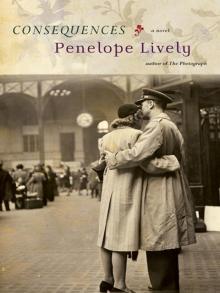 Consequences
Consequences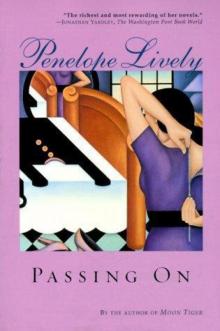 *****Passing On*****
*****Passing On*****